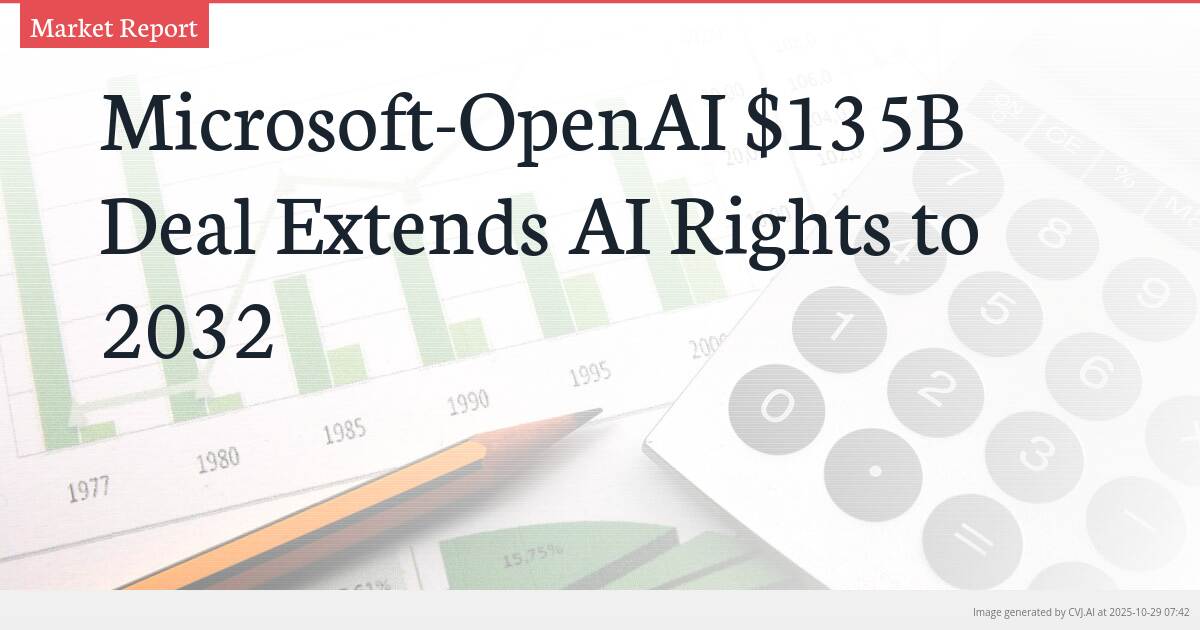This summary text is fully AI-generated and may therefore contain errors or be incomplete.
Introduction
Microsoft has cemented its position in the artificial intelligence landscape through a restructured partnership with OpenAI that values its stake at $135 billion while extending exclusive rights to frontier AI models through 2032. The comprehensive agreement comes as both companies navigate antitrust scrutiny and a federal lawsuit alleging Microsoft leveraged its Azure cloud dominance to artificially inflate ChatGPT pricing, creating a complex backdrop for one of the most significant AI partnerships in the industry.
Key Points
- Microsoft retains exclusive IP licenses to OpenAI's AI models through 2032, including rights to post-AGI systems, but holds no rights to consumer hardware OpenAI produces
- OpenAI can now collaborate with third-party developers, deploy open-weight models meeting safety standards, and serve U.S. national security agencies on any cloud infrastructure
- The partnership faces antitrust scrutiny with a class-action suit alleging Microsoft used Azure dominance to maintain ChatGPT prices at '100-200 times' competitor levels
The Restructured Partnership Framework
The newly announced partnership represents a strategic evolution of the relationship that began in July 2019 with Microsoft’s initial $1 billion investment, which established the tech giant as OpenAI’s exclusive cloud provider. Under the revised terms, Microsoft’s $135 billion stake constitutes approximately 27% of OpenAI’s new public-benefit company structure, known as OpenAI Group PBC, which operates under the nonprofit OpenAI Foundation. This valuation reflects the immense growth and potential both companies see in their collaborative AI efforts.
Microsoft secures its position as OpenAI’s ‘frontier model partner’ through 2032, granting the company exclusive intellectual property licenses to OpenAI’s models and products, including rights to systems developed after artificial general intelligence (AGI) is achieved. However, the agreement specifically excludes any rights to consumer hardware that OpenAI might produce, creating clear boundaries around the partnership’s scope. The governance structure also sees consolidation of authority, with board chair Bret Taylor and CEO Sam Altman gaining control over appointment and removal powers for the PBC’s board.
The financial arrangement maintains OpenAI’s commitment to channel approximately 20% of its revenue to Microsoft, though both parties anticipate this revenue stream will cease once an independent panel certifies that AGI has been achieved. This provision represents a significant milestone-based approach to the partnership’s financial terms, aligning incentives while acknowledging the transformative potential of AGI development.
Operational Flexibility and New Freedoms
OpenAI gains substantial operational flexibility under the new agreement, marking a departure from previous restrictions. The AI company can now collaborate with third-party developers on joint products, deploy open-weight models that meet established safety thresholds, and serve U.S. national security agencies using any cloud infrastructure. This represents a significant expansion of OpenAI’s commercial and governmental engagement capabilities beyond the previous Microsoft-exclusive framework.
Perhaps most notably, OpenAI now has the freedom to independently pursue its own AGI research capabilities, which were previously constrained by Microsoft’s exclusivity provisions. This dual-track approach allows both companies to explore AGI development while maintaining their core partnership. The agreement specifies that API products developed with third parties will remain exclusive to Azure, while non-API products may be served on any cloud provider, creating a balanced approach to platform exclusivity.
The partnership also addresses infrastructure concerns through OpenAI’s commitment to purchase $250 billion in additional Azure services, while Microsoft surrendered its first-refusal rights as compute provider. This concession resolves what had become a major friction point as ChatGPT’s 800 million weekly users and escalating research demands drove infrastructure costs higher, creating tension around the exclusive sourcing requirement.
Antitrust Scrutiny and Market Implications
The partnership announcement arrives amid mounting legal pressure, including a class-action suit filed just two weeks earlier that alleges Microsoft weaponized its 2019 Azure exclusivity arrangement to throttle computational capacity for ChatGPT. The lawsuit claims this artificial constraint maintained subscription rates at ‘100 to 200 times’ competitors’ levels during February’s AI pricing conflict, raising serious questions about market competition and cloud computing dominance.
Jiahao Sun, CEO of FLock.io, highlighted the broader industry concerns in comments to Decrypt, stating: ‘The AI we build today will shape our tomorrow. The path we are currently on, dominated by centralized AI, is fraught with peril. When a few powerful entities control AI, we risk creating systems that reflect a narrow worldview, perpetuating biases, and eroding trust.’ This perspective underscores the competitive and ethical considerations surrounding the Microsoft-OpenAI partnership’s market position.
The timing of these developments coincides with OpenAI’s disclosure concerning mental health signals among its user base, with approximately 1.2 million weekly users (roughly 0.15% of actives) showing explicit indicators of suicidal planning or intent. While not directly related to the partnership restructuring, this revelation adds another layer of complexity to the responsible development and deployment of advanced AI systems that the Microsoft-OpenAI collaboration must navigate.
📎 Read the original article on decrypt.co

